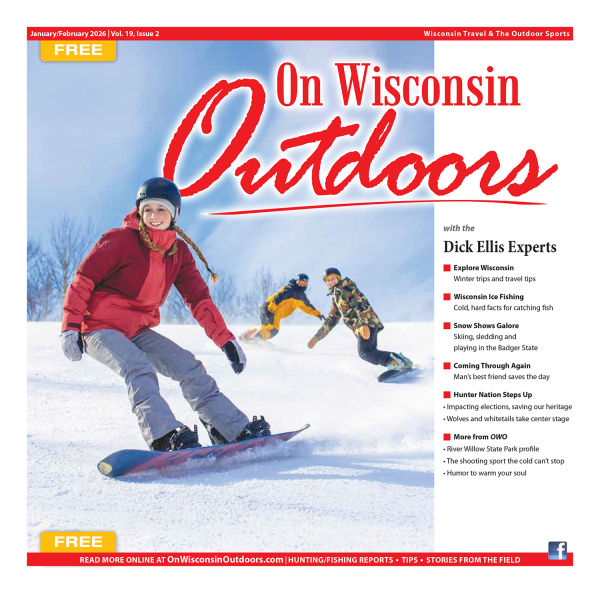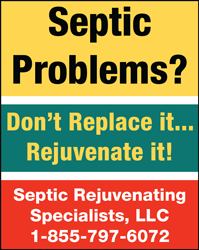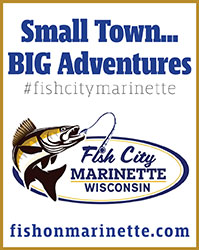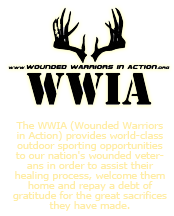Fish farms, Grand River Marsh Dam, Trout Regulations, Hunters With Disabilities & Bear Conflicts, Hunter Ethics Award Winner
DNR News Roundup
· Fish Farms Seek Renewal Of Permits To Operate In Public Waters
· Grand River Marsh Dam Access Restricted As Dam Repair Construction Begins
· 2020-2021 Trout Regulation Changes
· Sponsors For Hunters With Disabilities Sought For 2020 Gun Deer Hunt
· Take Steps Now To Avoid Potential Conflicts With Bears
· Hunter Ethics Award Honors Character: Oshkosh Man’s Efforts To Match Lost Crossbow To Owner Cited
Contact: Joe Bevington, DNR Fisheries Biologist
608-264-9257 or Joseph.Bevington@wisconsin.gov
Paul Cunningham, DNR Fisheries Ecologist
608-267-7502 or Paul.Cunningham@wisconsin.gov
Fish Farms Seek Renewal Of Permits To Operate In Public Waters
MADISON, Wis. – The Wisconsin Department of Natural Resources has posted a list of fish farms that have applied for Natural Waterbody Permit renewals on the DNR public website in accordance with the 2011 Wisconsin Act 207.
Fifty fish farms in 26 counties, operating in natural waters, have applied to renew their permits to operate in those waters under the 1997 state law governing aquaculture in Wisconsin. Since all navigable waters in the state belong to the public, state law requires the department to request if anyone has an objection to the permit. The public has 30 days to file an objection and request a hearing on permit applications.
The DNR will grant the permits if the following criteria are met:
- No objection is filed
- The agency finds no substantial public interest exists in the waters where the fish farm is located
- The operation of the fish farm does not have a negative impact on public or private rights to those waters
These public rights include:
- Plant and wild animal habitat or populations
- Water quality and quantity in lakes, streams or rivers
- Threatened or endangered species or their habitats
- Wetlands
- The public’s right to navigate and associated incidents to navigation including fishing, swimming, wading and canoeing
The list of Natural Waterbody Permit applications to be publicly noticed may be found on the DNR website here.
Grand River Marsh Dam Access Restricted As Dam Repair Construction Begins
OSHKOSH, Wis. – Construction on the Grand River Marsh Dam is underway to repair storm damage sustained in August 2018. Water levels in the impoundment will remain completely drawn down, and portions of the dam will be fenced off from public access until the repairs are completed.
Water levels remain too low for boat launching, and opportunities for angling and waterfowl hunting will be significantly reduced. Public access is still allowed during most phases of the project, with heavy equipment secured behind fencing. Construction vehicles will have the right of way along the dam access road, and we ask the public to be respectful of the secured workspace at all times.
“We regret the inconvenience to those affected by the drawdown at the Grand River dam,” said Jeff Lang, a wildlife technician with the Wisconsin Department of Natural Resources. “This is a favorite spot in our area for hunters and anglers, and we understand the need to get the dam fixed and raise water levels in the impoundment.”
The repair work is projected to be completed in November 2020.
2020-2021 Trout Regulation Changes
MADISON, Wis. – The Wisconsin Department of Natural Resources is issuing two corrections to the 2020-2021 Guide to Wisconsin Trout Fishing Regulations effective May 2, 2020.
The 2020-2021 Guide to Wisconsin Trout Fishing Regulations contained incorrect bag and length limits and gear restrictions for two popular streams in southwest Wisconsin. Anglers should note the following regulations are in effect for:
Castle Rock Creek downstream of the third County Highway Q bridge to Witek Road
- Daily bag limit: two trout over 12 inches in length
Castle Rock Creek between the third County Highway Q bridge and Church Road, including Castle Rock Spring
- Daily bag limit: ALL trout caught shall be immediately released
- Gear restriction: ONLY artificial lures may be used
Gordon Creek
- From South 78 upstream to Spring Creek Road
- Daily bag limit: 5 trout under 12 inches in length
Updated regulations can be viewed here.
Landowners can open the outdoors to hunters with disabilities by enrolling to be a sponsor by June 1. / Photo Credit: John Martinson
Contact: Matthew Gross, DNR Assistant Big Game Ecologist
608-261-7588 or Matthew.Gross@wisconsin.gov
Sponsors For Hunters With Disabilities Sought For 2020 Gun Deer Hunt
MADISON, Wis. – Sponsors and landowners interested in hosting a unique hunting opportunity for disabled hunters are reminded of the fast-approaching June 1 deadline to enroll their lands in the 2020 Gun Deer Hunt for Hunters with Disabilities.
Sponsors are encouraged to enroll at least 60 acres of land and must allow at least three disabled hunters access during the hunt, which occurs from Oct. 3-11.
In 2019, more than 85 landowners in 42 counties enrolled roughly 70,000 acres of hunting land, providing opportunities for more than 430 participants to enjoy hunting when the weather is more conducive to mobility in the woods for people with particular challenges.
Online applications are available here. If you do not have online access, please contact Matthew Gross, DNR Assistant Big Game Ecologist, directly for a physical copy.
A full list of hunt sponsors will be available on the DNR website after June 10. Interested hunters are encouraged to contact sponsors as soon as possible to determine space availability. Each hunter may enroll to hunt no more than one property per year and must do so no later than Sept. 1.
Limit bear nuisance activity this spring by taking away easy food sources. / Photo Credit: Wisconsin DNR
Contact: Brad Koele, DNR Wildlife Damage Specialist
608-576-3914 or Bradley.Koele@wisconsin.gov
Take Steps Now To Avoid Potential Conflicts With Bears
MADISON, Wis. – Many black bears have begun to emerge from their dens throughout Wisconsin. The Department of Natural Resources encourages residents to take precautions to avoid potential conflicts.
Black bears normally avoid contact with people, but when food is available near homes and businesses, bears can quickly learn to associate humans with food.
"As the weather warms and we all get outside more, some of our activities can generate food sources for bears,” said DNR Wildlife Damage Specialist Brad Koele. “Grilling outdoors, feeding birds and unsecured trash cans can lead to conflict when they become bear food sources. It is important to make sure these attractants are inaccessible to bears at all times of the year, but it’s especially important in spring when natural food sources are limited.”
If a bear finds easily accessible bird feed or garbage container near your home, it will likely return. Visits are more likely to stop if the food source is removed. Bears will periodically check sites where food was once available, so it may take several days to weeks after a food source has been removed for a bear to completely abandon a site.
Residents can follow these steps to avoid attracting black bears:
- Do not knowingly feed a bear
- Completely remove bird feeders, even during daytime hours. Bears are active during the day and may cause problems even if the feeders are out only during that time
- Clean areas where bird feeders were located so that accumulated deposits of spilled seed are removed
- Reduce garbage odors by rinsing food cans before putting them in covered recycling containers or garbage cans
- Keep meat scraps in the freezer until garbage day, and if possible, keep garbage cans in a closed building until the morning of pick-up
- Be sure to lock commercial dumpsters
- Keep pet food inside or inaccessible to bears even during daytime hours
- Keep barbecue grills and picnic tables clean.
The Living with Bears in Wisconsin fact sheet can help landowners learn more about co-existing with bears in Wisconsin.
"We are encouraging property owners and occupants to take actions now to avoid conflicts with bears,” said Koele. “Taking proactive steps now will decrease the likelihood that wildlife personnel will need to conduct site visits and implement control efforts. This is especially important as we continue to deal with COVID-19 and the need for social distancing.”
If a bear is near your home, wave your arms and make noise to scare it away. Back away slowly and seek a safe location where you can wait for the bear to leave. When scaring a bear away, make sure it has a clear escape route; never corner a bear. If you encounter a bear while in the woods, stay calm and do not approach the bear. Never approach a sow with cubs, and do not attempt to break up a fight between your pet and a bear.
The DNR partners with the U.S. Department of Agriculture’s Wildlife Services Program to respond to approximately 800 bear-related complaints reported in Wisconsin each year. Homeowners who are unable to resolve a conflict with a bear should contact the USDA Wildlife Services toll-free line at 1-800-433-0663 for properties in southern Wisconsin and 1-800-228-1368 for properties in northern Wisconsin.
For more information regarding bears and safety, visit the DNR website here.
2019 Hunter Ethics Award Winner Hank Xiong. / Photo Credit: Hank Xiong
Contact: DNR Chief Conservation Warden Casey Krueger
casey.krueger@wisconsin.gov
Hunter Ethics Award Honors Character: Oshkosh Man’s Efforts To Match Lost Crossbow To Owner Cited
Loss Of Treasured Crossbow Was Inspiration To Help Another In Same Situation
MADISON, Wis. – An empathetic 29-year-old Oshkosh man, fueled by a personal loss, took the extra steps to reunite the owner to his treasured crossbow found in a parking lot at the White River Marsh Wildlife Area in central Wisconsin. The action earned the man the 2019 Wisconsin Department of Natural Resources Ethical Hunter Award.
Hank Xiong said his drive to find the owner was fueled by his own bad memories when he was younger when his own prize bow was taken from the back of his father’s truck. Xiong said it was devastating for him and he didn’t want that to happen to another.
“I saved and saved to get that bow and finally got a day off work from my seven-day job but couldn’t hunt," he said.
Due to the COVID-19 health emergency, Xiong will be presented the award at a ceremony yet to be scheduled. He will receive the honor from DNR Bureau of Law Enforcement Capt. April Dombrowski, who leads the bureau’s recreational safety and outdoor skills section, and Shamus Terry of Vortex Optics, an international manufacturer of rifle scopes, binoculars and ranger finders based in Barneveld, Wis.
Established in 1997, the Hunter Ethics Award recognizes a hunter whose action is symbolic of Wisconsin's hunting heritage. A heritage that is not about trophy bucks or number of pheasants - but of an outdoor tradition enjoyed responsibly, respectfully, and safely by and for all.
DNR Chief Warden Casey Krueger said ethical behavior demonstrates the moral character of the hunting public and illustrates how people can assist one another while recreating together in the outdoors.
“Ethical action can be represented in many ways, examples could include helping another during a hunt, or taking steps to in order to protect our natural resources,” Krueger said. “Over the years, award recipients have returned lost gear as in this year’s winner, helped others find lost game or assisted another hunter facing a challenge of some kind.”
Xiong met Jim Bonney, the crossbow owner, early the previous morning when the two parties set out to hunt deer during the Wisconsin archery/crossbow season at the wildlife area in Green Lake and Marquette counties.
After Xiong and his uncle returned to the lot to leave, Bonney’s vehicle was gone but the crossbow was laying near where the car had been parked. “We talked about the best way to get it back to the rightful owner, who we believed to be Jim.”
Leaving the crossbow there or taking it to a local sheriff’s office crossed Xiong’s mind as he talked with his hunting partners.
“We waited for an hour and no one returned that evening, so I took the crossbow, posted a note on Facebook, and then stopped by a sheriff’s office to report the incident,” Xiong said. “I agreed to try to find the owner. And, if I didn’t, I’d bring the bow back to the sheriff to keep until someone reported it missing.”
The next day Xiong returned to the parking lot, about 40 miles from his Oshkosh home.
“Jim drove in a bit later, about 2 p.m., and had a big grin on his face when I handed him the crossbow,” Xiong said. “Jim thanked me, and we exchanged contact information agreeing to keep in contact.”
Bonney said he went back to the parking lot the next morning thinking maybe the bow was still there, but nothing.
“Then, I came back that afternoon and saw Hank and he handed me my bow and took my picture,” he said. “I liked the bow, shot a few deer with it and am grateful Hank took the effort to get it back to me,” Bonney said.
A four-person committee studies the nominations and selects the person judged most deserving of this award. The annual honor was established by Bob Lamb, retired outdoors editor of the La Crosse Tribune, retired DNR conservation warden supervisor Steve Dewald and retired University of Wisconsin-La Crosse biology professor and outdoors writer Jerry Davis.
“Hank demonstrated behavior that reflects positively on the tradition of hunting in Wisconsin. His concern for another hunter losing equipment was very admirable,” Dewald said.
“Hank is the epitome of the award’s intent, going well beyond what he did for another hunter,” Lamb added.
Any hunter or non-hunter can nominate a licensed Wisconsin hunter for the DNR Ethical Hunter Award for an action that took place during the calendar year of 2019. Although many nominations are made during gun-deer season, the ethical action could be something done during a squirrel hunt, turkey hunt, waterfowl hunting or any other Wisconsin hunting season.
Nominations for the 2020 award are due Jan. 15, 2021 and can be sent to any committee member, or any Wisconsin DNR field warden.











